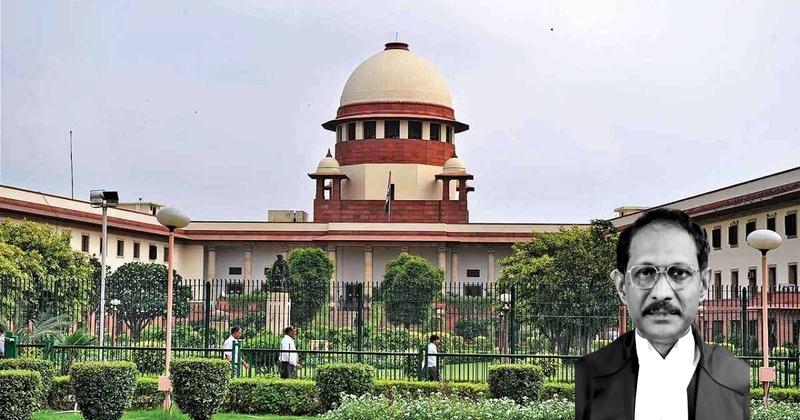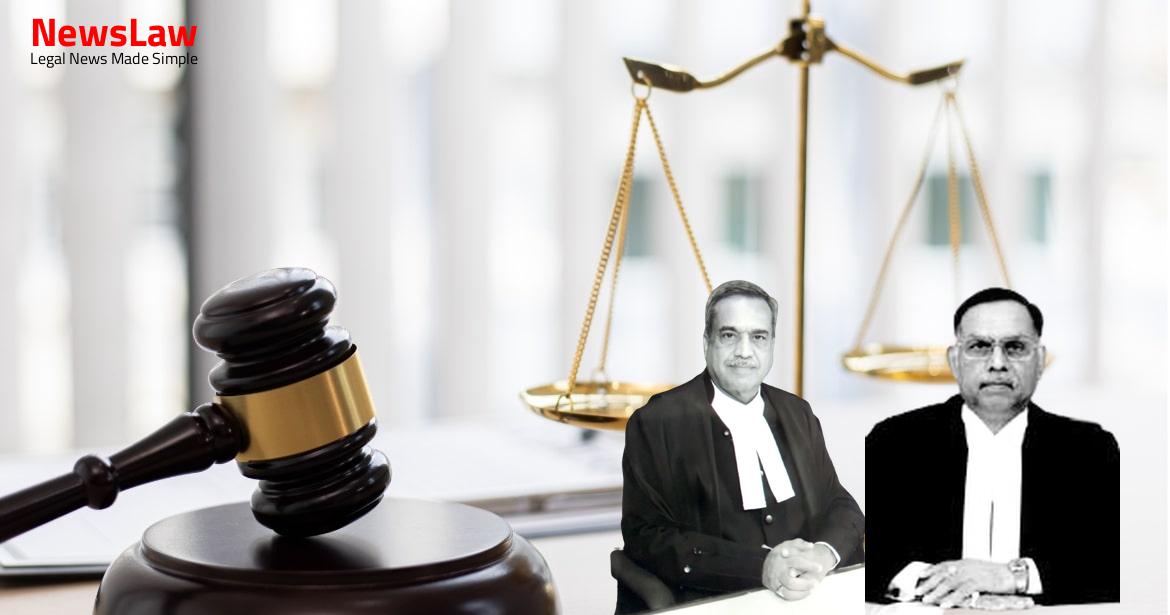In the case involving allegations of cheating, the appellant challenged the order passed by the Single Judge of the High Court, rejecting the petition under Section 482 of Cr.P.C. to quash the FIR. Specific allegations were made in the FIR against the appellant for a cognizable offense, requiring in-depth investigation. The case revolves around financial dealings between the parties, including the complainant and the accused individuals. Stay tuned to learn more about the legal intricacies of this case.
Facts
- Accused No 1 disposed of 58 plots and failed to return Rs.1,00,00,000/- with interest to the complainant.
- Cancelled power of attorney without notice and sold land to third parties.
- Complainant joined gold chit business on insistence of accused and paid Rs.21,60,000/-.
- Accused executed General Power of Attorney and sale deed in favor of the complainant.
- Accused cheated the complainant of Rs.16,01,00,000/- through fraud and breach of trust.
- Charge-sheet filed on 4 January 2023.
- Cheque for repayment of Rs.58,50,000/- returned due to insufficient funds.
- Complaint filed on 7 November 2020 leading to registration of FIR.
- Complainant transferred various sums to accused totaling Rs.1,60,01,000/-.
- Registered mortgage deed executed by accused No 1 in favor of the complainant.
- Accused Nos. 1 and 2 swindled amounts and cheated the complainant.
- Memorandum of understanding signed by complainant for financial help to accused No 1.
- Agreement to repay financial help within 20 months with 100% profit.
- Various transactions and agreements related to financial dealings between parties.
- Complainant helped accused No. 2 with hand loan, transferring money to accused No. 3.
- Transfer of large sums between accused for land purchase at Chittoor Village.
- Complaint filed leading to the present appeal.
- The High Court rejected the petition under Section 482 of Cr.P.C. for quashing of the FIR but directed the investigating agency to complete the investigation within twelve weeks.
- The Single Judge of the High Court observed that the intention of the appellant and other accused persons was to cheat the complainant, as per the FIR.
- Specific allegations were mentioned in the FIR against the appellant for a cognizable offence, requiring in-depth investigation.
- The Single Judge held that since the FIR disclosed commission of a cognizable offence, the High Court could not interfere with the investigation.
- The present appeal challenges the order passed by the Single Judge of the High Court, rejecting the appellant’s petition under Section 482 of Cr.P.C. to quash the FIR.
Also Read: NBCC (India) Limited vs. Zillion Infraprojects Pvt. Ltd.
Arguments
- The appellant’s counsel argues that the FIR and charge-sheet do not establish any case of cheating under Section 420 of IPC against the appellant.
- It is emphasized that there is no mention of inducement, fraud, or dishonesty by the appellant in relation to the transaction of Rs.20,00,000/-
- To constitute the offense of cheating, intentional inducement, dishonesty, or fraudulence must be demonstrated, as per various judgments cited.
- The appellant’s transfer of land to accused No 1 through a Sale Deed the day after receiving the money is highlighted as evidence that the appellant had no further involvement.
- Subsequent events involving the cancellation of GPA and execution of a sale deed to other parties are deemed unrelated to the appellant.
- The respondent’s counsel argues that the charge-sheet has been filed, making the appeal irrelevant.
- The respondent suggests that the appellant can apply for discharge instead.
- It is contended that the appeal does not require any intervention.
Also Read: State vs. Accused No. 1: Quashing of Criminal Proceedings
Analysis
- The principles relating to the exercise of jurisdiction under Section 482 of the Code of Criminal Procedure to quash complaints and criminal proceedings have been stated and reiterated in several decisions by the Court.
- A complaint can be quashed if the allegations, even if taken at face value, do not prima facie constitute any offense against the accused, without examining the merits of the allegations.
- The jurisdiction under Section 482 must be exercised to prevent the abuse of the court process or to secure justice.
- Courts should curb unnecessary prosecutions and harassment of innocent parties by using their power under Section 250 CrPC more frequently if malice or frivolousness is detected in the complaint.
- There is a growing tendency in business circles to convert civil disputes into criminal cases, which the power under Section 482 aims to prevent.
- The offense under Sections 415 and 420 of IPC requires elements like valuable security or anything convertible into valuable security for Section 415 and cheating for Section 420.
- The power under Section 482 can be exercised even when a discharge application is pending with the trial court but should not be used to stifle a legitimate prosecution.
- Detailed inquiry or analysis of material is not necessary while examining a prayer for quashing a complaint.
- Efforts to settle civil disputes using pressure through criminal prosecution should be deprecated and discouraged.
- The provision invoked by the accused is Section 482 CrPC, which allows the High Court to make necessary orders to prevent abuse of the court process or secure justice.
- The power should be used sparingly and with abundant caution.
- Quashing of the complaint is warranted only where the complaint is so bereft of even the basic facts necessary for making out the offence of Section 420 of IPC.
- A commercial transaction or a contractual dispute may involve a criminal offence but should not be misused to settle civil disputes.
- The complaint should disclose the dishonest inducement to attract the provisions of Sections 415 and 420 of IPC.
- The abuse of process caused by FIR stands aggravated if it has taken the form of a charge-sheet after investigation.
- The complaint is not required to verbatim reproduce the legal ingredients of the offence alleged.
- The mere fact that the complaint relates to a commercial transaction, for which a civil remedy is available, is not a ground to quash the criminal proceedings.
- The allegations in the complaint must disclose a criminal offence to proceed further.
- For attracting the provision of Section 420 of IPC, the FIR/complaint must show the ingredients of Section 415 of IPC being made out.
- Cheating is defined as fraudulently or dishonestly inducing a person to deliver property or consent to retaining property through deception.
- There must be intentional inducement by deceiving the person to deliver property or to do something they would not otherwise do.
- The act or omission induced must result in damage or harm to the deceived person in body, mind, reputation, or property.
- Section 420 of the Penal Code specifically addresses cheating and dishonestly inducing the delivery of property, with penalties of imprisonment and fines.
- To constitute an offense under Section 420, the individual must commit the offense of cheating under Section 415 and dishonestly induce the deceived person to deliver property or manipulate valuable securities.
- The continuation of the criminal proceedings against the present appellant is considered as an abuse of the process of law and would result in a miscarriage of justice.
- The argument by the respondents that the appeal should be dismissed since the charge-sheet has been filed is refuted by referring to a specific case (Anand Kumar Mohatta and Another v. State NCT of Delhi Department of Home and Another).
Also Read: Susela Padmavathy Amma vs. Bharti Airtel Limited – Director Liability Case
Decision
- The FIR in Crime No.21 of 2020 and the consequential charge-sheet against the present appellant are quashed and set aside.
- The order of the High Court dated 15 July 2022 in Criminal O.P. No.20716 of 2020 and Criminal M.P. No 8763 of 2020 is quashed and set aside.
- Pending application(s), if any, shall stand disposed of.
- The appeal is allowed.
Case Title: A.M. MOHAN Vs. THE STATE REP BY SHO (2024 INSC 233)
Case Number: Crl.A. No.-001716-001716 / 2024



